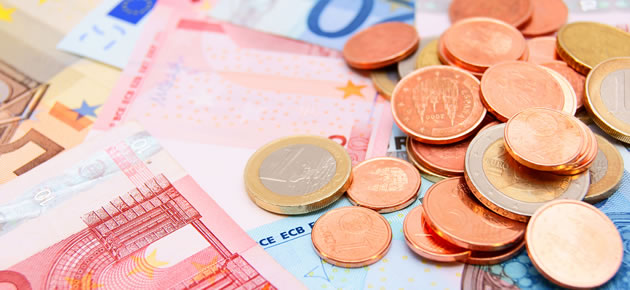The Euro to Pound (EUR/GBP) Exchange Rate strengthened on Tuesday after weaker than forecast inflation data weighed upon the UK currency.
The single currency managed to make gains against the Pound despite being under pressure from last week’s data releases, which showed that economic growth in the 18 member Eurozone, stalled in the second quarter and that the inflation in the region weakened yet again, raising fears over deflation.
A report published earlier on Tuesday by the European Central Bank also put pressure on the Euro after it showed that the Eurozone’s current account surplus narrowed in June.
The report showed that the regions current account balance, a broad measure of an economy’s international financial position, was in a surplus of €13.1 billion in adjusted terms in June, below €19.8 billion in May.
The decline now means that the regions current account surplus is at its lowest level in 20-months.
For the 12-month period that ended in June 2014, the surplus was 2.4% of the Euro zone’s gross domestic product, higher than the 2.1% in the 12 months to June 2013.
The seasonally adjusted 12-month cumulated current account for the period ending in June recorded a surplus of €226.7 billion, 2.4% of euro area GDP, compared with one of €198.4 billion, and 2.1% of Euro area GDP for the previous 12-month period.
Normally such a report would weigh upon the Euro further and add to market concerns over the strength of the Eurozone economy but on Tuesday, those concerns were overshadowed by the publication of weaker than forecast UK inflation data.
According to the Office for National Statistics (ONS), UK inflation cooled more than forecast in July, reducing the likelihood that the Bank of England will raise interest rates before the end of 2014.
The data showed that the rate of price growth eased to 1.6% in July from the 1.9% recorded in June. Falling prices of clothing, food goods and other products were blamed for the sharper than expected drop.
The softer than expected inflation data disappointed economists who had been betting for an interest rate rise in November as the Bank of England is now under less pressure to hike rates.
‘With dovish comments from BoE Governor Mark Carney last week, this fall in inflation will provide the MPC with even more reason to hold out for Q1 2015 before tightening monetary policy. We may learn more tomorrow about the intended timeframe for a rate hike when the minutes of the latest MPC meeting are released,’ said a forex dealer.
In the Eurozone, economists will be monitoring the latest Construction output report. With the region experiencing a run of disappointing data the report is likely to come in below expectations.
Euro Exchange Rate News:
[table width=”100%” colwidth=”50|50|50|50|50″ colalign=”left|left|left|left|left”]
Currency, ,Currency,Rate ,
Euro,
Euro,
Euro,
Euro,
[/table]
